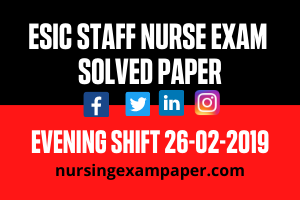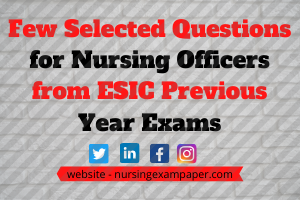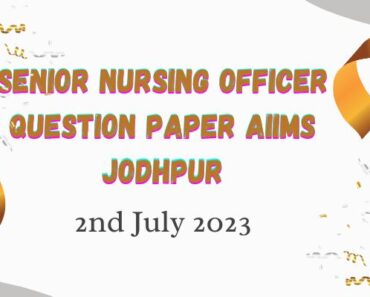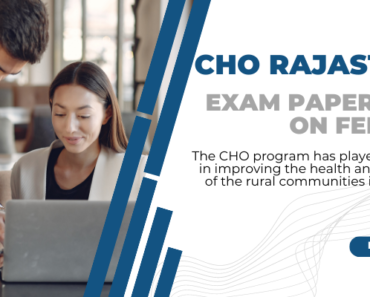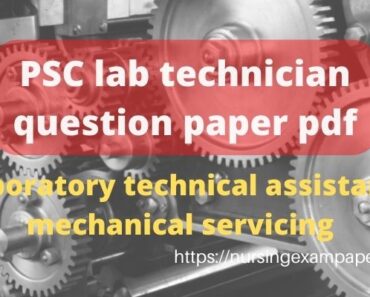Dear future nursing officers, our team (Nursingexampaper.com) is dedicated to providing study material for the preparation of competitive examinations. We help you find out and solve the previous year’s exam papers. In this post, we are providing a solved paper of ESIC Nursing Exam Morning Shift 26-02-2019. ESIC staff nurse MCQ questions and answers 2016, ESIC staff nurse exam solved paper pdf.
ESIC staff nurse model question paper with answer free download. you also download this paper in pdf format from our website. the PDF link is given in this post/paper. Aiims Online Nursing Exam Click Here.
For Download ESIC Exam Paper 2019 Pdf Click Here
Section: Technical Professional Subject
Q l. Among the following, the bone that belongs to the axial skeleton is:
- Patella
- Hyoid
- Tarsals
- Humerus
2. Hyoid
Q 2. The term resourcefulness implies:
- Sense of belonging
- Involvement in spiritual activities
- Problem-solving ability
- Ability to handle stressful situations
Problem-solving ability
Q 3. If palpating the tragus or auricle causes pain, the problem is:
- Otitis externa
- Otitis media
- Pharyngitis
- Sinusitis
Otitis externa
Q 4. Bleeding in the first trimester with no uterine contraction or pain and no dilation of cervix indicate:
- Missed abortion
- Complete abortion
- Inevitable abortion
- Threatened abortion
Threatened abortion
Q 5. Tropomyosin in the muscle fiber is a_____ protein.
- regulatory
- structural
- anchoring
- contractile
regulatory
Q 6. Scrub typhus is caused by:
- Rickettsia akari
- Rickettsia typhi
- Orientia tsutsugamushi
- Rickettsia prowazekii
Orientia tsutsugamushi
Q 7. The microorganism that is usually a part of the normal vaginal flora but can cause meningitis in newborns is:
- Staphylococcus epidermidis
- Candida albicans
- Corynebacterium species
- Group B streptococci
Group B streptococci
Q 8. वह कौन सा हार्मोन है, जो वाटर चैनल या एक्वापोरिन को डालकर पानी के पुनः अवशोषण में बढ़ोतरी करता है ?
- एंटी डायूरेटिक हार्मोन
- एल्डोस्टेरोन
- एट्रियल नट्रिउरेटिक पेप्टाइड
- एंजियोटेनसिन
एंटी डायूरेटिक हार्मोन
Q 9. The third phase of body’s adaptation to stress is:
- Reaction
- Exhaustion
- Resistance
- Rebound
Exhaustion
Q.10. The surgical intervention for pain management, which involves cutting a nerve root to relieve pain, is called:
- Craniotomy
- Cordotomy
- Rhizotomy
- Radiofrequency ablation
Rhizotomy ESIC Exam Paper 2019 Question And Answer in Pdf
Q 11. The condition in which false beliefs are firmly maintained even though they are not shared by others is called:
- Illusion
- Delirium
- Hallucination
- Delusion
Delusion
Q 12. Positive Brudzinski’s and Kemig’s signs are indicative of:
- Hemiplegia
- Meningitis
- Alcohol intoxication
- Peripheral neuropathy
Meningitis
Q 13. In a patient taking high doses of acetaminophen over a prolonged period, the parameter to be monitored regularly is:
- Liver function
- Kidney function
- Prothrombin time
- GI irritation
Liver function
Q 14. इनमें से कौन नियोजन की परिचर्या (नर्सिंग) प्रक्रिया का एक भाग नहीं है ?
- समस्याओं /निदानों को प्राथमिकता देना।
- नर्सिंग हस्तक्षेप लिखना।
- लक्ष्यों / मनपसंद परिणामों को निरूपित करना।
- सौंपे गए देखभाल कार्य की निगरानी करना।
सौंपे गए देखभाल कार्य की निगरानी करना।
Q 15. Which of the below is an example of unintentional tort?
- Negligence
- Assault
- Invasion of privacy
- Defamation
Negligence
Q 16. The minimally invasive technique by which thin, insulated lead wire with electrodes (neurostimulator) is surgically implanted in the brain is called:
- Deep brain stimulation
- Functional MRI
- Electroconvulsive therapy
- Transcranial magnetic stimulation
Deep brain stimulation
Q 17. A cell that takes part in innate immunity by killing virus-infected cells is: For Download ESIC Exam Paper 2019 Pdf Click Here
- NK cell
- Macrophage
- Neutrophil
- T cell
NK cell
Q 18. The first referral level in the healthcare system is:
- Secondary health care
- Primordial health care
- Tertiary health care
- Primary health care
Secondary health care
Q 19. A scale that cannot be used to assess a subject for a mood disorder is:
- Hamilton rating scale
- Wakefield questionnaire
- Beck inventory
- Edinburgh inventory
Edinburgh inventory
Q 20. When a person’s blood pressure drops, the kidneys respond by:
- Slowing the release of ADH
- Increasing urine output
- Secreting renin
- Producing aldosterone
Secreting renin
Q 21. The causative agent for the disease scrapie belongs to the category’ of:
- Viruses
- Prions
- Protozoans
- Bacteria
Prions
Q 22. Which of the below is NOT a component of HELLP syndrome?
- Low platelet count
- Bleeding per vaginum
- Hemolysis
- Elevated liver enzymes
Bleeding per vaginum
Q 23. Which of the below is NOT a sign of respiratory distress?
- Nasal flaring
- Changing of posture to ease breathing
- Speaking complete sentences
- Cyanosis
Speaking complete sentences
Q 24. The total number of fetal and early neonatal deaths per 1000 live births is called:
- Fetal death
- Neonatal death
- Perinatal mortality
- Intrauterine death
Perinatal mortality
Q 25. The normal order of events taking place during the second stage of labor is:
- Descent → flexion→ internal rotation → extension → crowning
- Descent → internal rotation→ crowning → extension→ flexion
- Descent→ flexion → internal rotation→ crowning → extension
- Descent → flexion → crowning → extension → internal rotation
Descent→ flexion → internal rotation→ crowning → extension
Q 26. रीमिशन (remission) का क्या अर्थ है?
- लक्षण फिर से दिखाई देने लगते हैं।
- व्यक्ति चिकित्स्कीय रूप से स्वस्थ हो गया है।
- रोग की गंभीरता बढ़ गई है।
- रोग विध्यमान है, लेकिन व्यक्ति को लक्षणों का अनुभव नहीं होता है।
रोग विध्यमान है, लेकिन व्यक्ति को लक्षणों का अनुभव नहीं होता है।
Q 27. The vertical transmission of diseases occurs through:
- droplets
- direct contact
- mosquitoes
- placenta
placenta
Q 28. The type of assessment done to compare the clients current status to previously obtained baseline data is called:
- Emergency assessment
- Initial assessment
- Problem-focused assessment
- Time-lapsed reassessment
Time-lapsed reassessment
Q 29. Bacillus cereus food poisoning is commonly associated with the consumption of:
- Bottled honey
- Green beans
- Fried rice
- Baked potato
Fried rice
Q 30. Respiratory rate multiplied by tidal volume gives:
ESIC Exam Paper 2019 Question And Answer in Pdf
- Total lung capacity
- Expiratory reserve volume
- Maximum voluntary ventilation
- Minute volume
Minute volume
Q 31. The organ that does not lie in the pelvic cavity is:
- Transverse colon
- Urinary bladder
- Rectum
- Fallopian tube
Transverse colon
Q 32. In the diagnostic statement “Excess fluid volume related to decreased venous return as manifested by lower extremity edema (swelling).” the etiology of the problem is:
- Edema
- Excess fluid volume
- Idiopathic
- Decreased venous return
Decreased venous return
Q 33. संकेत निवारक हस्तक्षेपों द्वारा लक्षित आबादी इनमें से कौन है?
- सामान्य आबादी
- किसी विकार के लिए उच्च जोखिम वाले व्यक्ति, जिनमें उस विकार के लिए जैविक चिह्नन है।
- पीड़ित परिवार।
- खास आयु वर्ग वाली आबादी।
किसी विकार के लिए उच्च जोखिम वाले व्यक्ति, जिनमें उस विकार के लिए जैविक चिह्नन है।
Q 34. संबंधित विचारों या कथनों के समूह को क्या कहा जाता है?
- दर्शनशास्त्र
- सिद्धांत
- रूपावली (पैराडाइम)
- वैचारिक रुपरेखा
वैचारिक रुपरेखा
Q 35. The dimension of health concerned with proper biological functioning is called:
- Spiritual dimension
- Social dimension
- Mental dimension
- Physical dimension
Physical dimension
Q 36. जीवाणु वृद्धि वक्र में चरणों का सही क्रम इनमे से कोन है?
- मंद → घातीय → पतन → स्थिर
- मंद → घातीय → स्थिर → पतन
- मंद → पतन → घातीय → स्थिर
- मंद → स्थिर → घातीय → पतन
मंद → घातीय → स्थिर → पतन
Q 37. Depolarisation in a nerve action potential is due to:
- Opening of sodium channels
- Opening of potassium channels
- Opening of calcium channels
- Closing of sodium channels
Opening of sodium channels
Q 38. Fine downy hair, normally found abundantly in premature babies, is called:
- Naevi
- Lanugo
- Caput
- Vemix
Lanugo
Q 39. निम्नलिखित में से वह कौन सा कार्य है जिसके लिए किसी पंजीकृत परिचारिका (नर्स) की आवस्यकता नहीं होती है, बल्कि उसे घरेलू स्वास्थ्य सहयोगी से करवाया जा सकता है?
- दवाओं के बारे में रोगी को बताना।
- ऑक्सीज़न के प्रवाह को समायोजित करना।
- रोगी को खाना खिलाना और नहलाना।
- घाव भरने की प्रगति का आकलन करना।
रोगी को खाना खिलाना और नहलाना।
Q 40. स्तनपान के साथ ठोस खाद्य पदार्थ खिलाना प्रारंभ करने के कार्य को क्या कहा जाता है?
- पूरक आहार (कंप्लीमेंट्री फीडिंग)
- आवश्यक आहार (डिमांड फीडिंग)
- प्रतिबंधात्मक आहार (कंडीशनल फीडिंग)
- निर्धारित आहार (शेड्यूल्ड फीडिंग)
पूरक आहार (कंप्लीमेंट्री फीडिंग)
Q 41. वह कौन सा समूह है, जिस पर हर्पीज जोस्टर का जोखिम अधिक होता है?
- एक्टॉपिक डर्मेटाइटिस से पीड़ित रोगी
- जन्मजात संक्रमण वाले शिशु
- बहुत अधिक उम्र वाले व्यक्ति
- गर्भवती महिला
बहुत अधिक उम्र वाले व्यक्ति
Q 42. Microcephaly is diagnosed when head circumference is less than:
- 2 standard deviations
- 4 standard deviations
- 3 standard deviations
- 1 standard deviation
3 standard deviations
Q 43. Proton pump in stomach is an example for:
- Simple diffusion
- Secondary active transport
- Facilitated diffusion
- Primary active transport
Primary active transport
Q 44. Which of the below is a mortality indicator?
- Disability rate
- Crude death rate
- Prevalence rate
- Incidence rate
Crude death rate
Q 45. An example of positive feedback mechanism in our body is:
- Oxytocin in childbirth
- Baroreceptor mechanism
- Regulation of thyroid hormone
- Temperature regulation
Oxytocin in childbirth
Q.46. A plane that passes through the midline of the body and divides it into equal right and left sides is called:
- Para-sagittal plane
- Oblique plane
- Coronal plane
- Mid-sagittal plane
Mid-sagittal plane
Q 47. अनाकर्षक व्यक्ति खुद पर ध्यान आकर्षित करवाने के लिए महंगे और स्टाइलिश कपडे चुनता है। यहां पर किस तरह के रक्षा तंत्र का उदाहरण दिया गया है?
- रूपांतरण
- अस्वीकरण
- पृथक्करन
- क्षतिपूर्ति ESIC Exam Paper 2019 Question And Answer in Pdf
क्षतिपूर्ति
Q 48. The cranial nerve affected in Bell’s Palsy is:
- Cranial nerve III
- Cranial nerve VII
- Cranial nerve IX
- Cranial nerve V
Cranial nerve VII
Q 49. लोकेशनल एमेनोरिया इनमे से किसके द्वारा गर्भनिरोधक विधि के रूप में कार्य करता है?
- डिम्बोत्सर्जन (ओव्यूलेशन) को रोककर
- शुक्राणुनाशक कार्यवाई करके
- आरोपण को रोक कर
- शुक्राणु के प्रवेश को रोककर
डिम्बोत्सर्जन (ओव्यूलेशन) को रोककर
Q 50. निम्नलिखित में से कोन स्कुल सेटिंग खतरों को नियंत्रित करने में सहायक नहीं होता है? For Download ESIC Exam Paper 2019 Pdf Click Here
- छात्रों को आपूर्ति की जाने वाली खाद्य आपूर्ति सुरक्षित होनी चाहिए।
- स्कुल का निर्माण शोर के स्त्रोत के नजदीक नहीं किया जाना चाहिए।
- पाठ्यक्रम में स्वास्थ्य शिक्षा को शामिल किया जाना चाहिए।
- स्कूल अच्छी तरह से हवादार होना चाहिए।
स्कुल का निर्माण शोर के स्त्रोत के नजदीक नहीं किया जाना चाहिए।
Q 51. The genera that needs pyridoxal for growth is:
- Aero coccus
- Granulicatella
- Pedi coccus
- Enterococcus
Granulicatella
Q 52. The term MRS A in bacteriology stands for:
- Methicillin Resistant Staphylococcus aureus
- Multidrug Resistant Staphylococcus aureus
- Methicillin Resistant Streptococcus anginosus
- Methicillin Reactive Staphylococcus aureus
Methicillin Resistant Staphylococcus aureus
Q 53. एक्सरे में वायु श्वसनिचित्र (एयर ब्रोंकोग्राम ) किस स्थिति में दिखाई देता है?
- रक्तविषंणता (सेप्सिस)
- दमा (ब्रोंकियल अस्थमा)
- श्वसन संकट संलक्षण (रेस्पाइरेटरी डिस्ट्रेस सिंड्रोम)
- यक्ष्मा (ट्यूबरकुलोसिस)
श्वसन संकट संलक्षण (रेस्पाइरेटरी डिस्ट्रेस सिंड्रोम)
Q 54. When perfonning suctioning on a patient, you should:
- Perform suction on the patient for longer than 10 seconds each time
- apply suction continuously while inserting the catheter
- oxygenate the patient’s lungs before and after suctioning procedure
- apply suction intermittently as the catheter is inserted
oxygenate the patient’s lungs before and after suctioning procedure
Q 55. The genetic exchange process in which donor DNA is introduced to the recipient by a virus is:
- Transduction
- Transformation
- Transfection
- Conjugation
Transduction
Q 56. जब आंत्र नियंत्रण (बोवेल कंट्रोल) सामान्य रूप से अपेक्षित होता है, तो उस उम्र के बाद अनुचित स्थानों पर बच्चे द्वारा मल के बार बार अनैच्छिक या जानबूझकर त्यागने को क्या कहा जाता है?
- असंयतपुरीषता (एंकोप्रेसिस)
- बुरे सपने
- असंयत मूत्रता (एन्यूरेसिस)
- रात में पसीने की समस्या
असंयतपुरीषता (एंकोप्रेसिस)
Q 57. किसी सामान्य औसत शिशु में, जन्म के समय से 1 वर्ष की आयु तक शरीर की लम्बाई में कितने प्रतिशत वर्द्धि होती है?
- 10%
- 75%
- 50%
- 20%
50%
Q. 58. Neuroleptic drugs are also known as:
- Antidepressants
- Hypnotics
- Antiepileptics
- Antipsychotics
Antipsychotics
Q 59. The relative risk of a disease can be obtained from:
1. Case study
2. Cohort study
3. Case-control study
4. Experimental study
Cohort study
Q 60. The professional value of nursing that describes the right to self-determination is called:
1. Integrity
2. Altruism
3. Dignity
4. Autonomy ESIC Exam Paper 2019 Question And Answer in Pdf
4. Autonomy
Q 61. Pepsinogen in the stomach is secreted by:
1. Chief cells
2. Parietal cells
3. Goblet cells
4. G cells
1. Chief cells
Q.62. The test used for the diagnosis of trichomoniasis is:
1. Enzyme-linked immunoassay (ELISA) test of serum
2. Ova and parasite fecal smear
3. Wet mount of vaginal fluid
4. Specific serologic test
3. Wet mount of vaginal fluid
Q 63. The type of hypersensitivity reaction due to IgE-mediated histamine release is called:
1. Type 3
2. Type 4
3. Type 2
4. Type 1
4. Type 1
Q 64. Voluntary rejection of unacceptable thoughts or feeling from conscious awareness is called :
1. Substitution
2. Suppression
3. Sublimation
4. Symbolisation
Suppression
Q 65. An affective disorder among the following is:
1. Schizophrenia
2. Phobic anxiety disorder
3. Bipolar disorder
4. Somatoform disorder
3. Bipolar disorder
Q 66. Intermittent claudication is a sign of:
1. Arterial occlusive disease
2. Nerve injury
3. Peripheral neuropathy
4. Myocardial infarction
1. Arterial occlusive disease
Q 67. A rapid grower among the following is:
1. Mycobacterium Bovis
2. Mycobacterium avium
3. Mycobacterium gordonae
4. Mycobacterium abscessus
4. Mycobacterium abscessus
Q 68. According to Maslow’s hierarchy, the need to be well thought of by oneself as well as by others comes under:
1. Self-awareness needs
2. Self-esteem needs
3. Security and safety needs
4. Physiological needs
2. Self-esteem needs
Q 69. Which of the below is true with regard to pregnancy-induced hypertension?
1. Visual disturbance are always present
2. Proteinuria is usually present
3. Tliere is raised BP before 20 weeks’ gestation
4. It is also called as gestational hypertension
4. It is also called as gestational hypertension
Q 70. The action of the sympathetic system in the walls of airways is called:
1. Increased gas exchange
2. Bronchodilation
3. Bronchoconstriction
4. Increased secretion
2. Bronchodilation
Q 71. The test that’s most specific for myocardial damage is:
1. Creatinine kinase
2. Ck – mb
3. Myoglobin
4. Troponin I
4. Troponin I
Q 72. Newborn maturity rating is done using:
1. Ballard score
2. Olliander score
3. Chandler score
4. Apgar score
1. Ballard score
Q 73. Which of the below7 is NOT a function of the fibrous skeleton of the heart?
1. Conducts the impulses from atria to ventricles
2. Acts as a point of insertion for cardiac muscle fibers
3. Prevents overstretching of the valves
4. Forms a structural foundation for the heart valves
1. Conducts the impulses from atria to ventricles
Q 74. When there is a possibility of locked twins being born?
1. Dichorionic diamniotic twins
2. First twin has a breech and the second twin has the cephalic presentation
3. Fraternal twins
4. First twin has cephalic and the second twin has a breech presentation
2. First twin has a breech and the second twin has the cephalic presentation
Q 75. An immovable joint is called:
1. Amphiarthrosis
2. Synarthrosis
3. Diartlirosis
4. Polyarthritis
ESIC Exam Paper 2019 Question And Answer in Pdf
2. Synarthrosis
Q 76. A mental illness specific to certain Indian populations where there is severe anxiety and hypochondriacaliy concerns are called:
1. Root work
2. Amok
3. Dhat
4. Nemos
3. Dhat
Q 77. The document that gives nurses the authority to carry out specific actions under certain circumstances, often when a physician is not immediately available, is called:
1. Standing order
2. Prescription
3. Discharge summary’
4. Concept map
1. Standing order
Q 78. Multiple sclerosis is characterised by:
1. Progressive demyelination in the CNS
2. Impaired cerebral circulation
3. Deficiency of the neurotransmitter dopamine
4. Deterioration of the spinal column
1. Progressive demyelination in the CNS
Q 79. The full form of DALY in the context of community health is:
1. Disability adapted life years
2. Disability-adjusted life years
3. Disease adapted life years
4. Disease adjusted life years
2. Disability-adjusted life years
Q 80. Pseudo hyphae are seen in:
1. Mucor
2. Penicillium
3. Aspergillus
4. Candida
4. Candida
For Download ESIC Exam Paper 2019 Pdf Click Here
Q 81. The mode of inheritance of cystic fibrosis is:
1. X linked disease
2. Autosomal recessive
3. Non-Mendelian
4. Autosomal dominant
2. Autosomal recessive
Q 82. The full form of GAS in the context of response to stress is:
1. General alarm syndrome
2. General alarm signals
3. General adaptation system
4. General adaptation syndrome
4. General adaptation syndrome
Q 83. The causative agent for bacterial vaginosis is:
1. Candida albicans
2. Herpes simplex
3. Gardnerella vaginalis
4. Chlamydia trachomatis
3. Gardnerella vaginalis
Q 84. Folic acid supplements in pregnancy are mainly used for the prevention of:
1. Neural tube defects
2. Gestational diabetes
3. Anemia in mother
4. Anemia in the fetus
1. Neural tube defects
Q 85. The most common cause of retinal detachment is:
1. Degenerative changes in the retina or vitreous
2. Trauma
3. Asthma
4. Diabetes mellitus
1. Degenerative changes in the retina or vitreous
Q 86. Which of the below is NOT a part of the secondary prevention of mental illness? ESIC Exam Paper 2019 Question And Answer in Pdf.
1. Screening
2. Rehabilitation
3. Crisis stabilization
4. Early detection
2. Rehabilitation
Q 87. The ‘Adam’s Apple” is formed by:
1. Epiglottis
2. Thyroid cartilage
3. Hyoid bone
4. Cricoid cartilage 1
2. Thyroid cartilage
Q 88. Which of the below is a confirmed indication of pregnancy?
1. Fetal heart in ultra-sonogram
2. Beta HCG in urine
3. Nausea and vomiting
4. Amenorrhea
1. Fetal heart in ultra-sonogram
Q 89. A non-opioid analgesic of the below is:
1. Naproxen
2. Pentazocine
3. Butorphanol
4. Buprenoiphine
1. Naproxen
Q 90. Poor skin turgor in neonates and infants indicates:
1. Dehydration
2. Hypocalcemia
3. Hypertonia
4. Hypoglycemia
1. Dehydration
Q 91. The anterior fontanelle closes by:
1. 2 months of age
2. Birth
3. 9 to 18 months of age
4. 2-3 years of age
3. 9 to 18 months of age
Q 92. Which of the below is NOT a role played by a nurse?
1. Communicator
2. Counselor
3. Caregiver
4. physician
4. physician
Q 93. Which is NOT a high-risk factor that might affect workers in a construction company?
1. Chest disease
2. Allergic diseases
3. Malnutrition
4. Traumatic injuries
3. Malnutrition
Q 94. The term ‘veracity’ in the context of nursing values refers to:
1. Being answerable for one’s actions
2. Being fair and just
3. Telling the truth
4. Being faithful to agreements
3. Telling the truth
Q 95. The advantage of using a three-part diagnostic statement such as the problem-etiology-signs/symptoms (PES) format is:
1. It helps the nurse in delegating
2. It standardizes organization of client data
3. It decreases the cost of healthcare
4. It improves communication between physician and nurse
3. It decreases the cost of healthcare
Q 96. इनमे से पिशीतांश (सारकोमिअर) के H जोन के लिए सही कथन है?
- इसमें मोटे या पतले तंतु नहीं होते हैं।
- इसमें केवल पतले तंतु होते हैं।
- इसमें केवल मोटे तंतु होते हैं।
- इसमें मोटे और पतले दोनों तंतु अगल-बगल होते हैं।
इसमें केवल मोटे तंतु होते हैं।
Q 97. During the age of 1 – 3 years, the developmental stage according to Freud’s theory is:
1. Anal
2. Phallic
3. Genital
4. Oral
1. Anal
Q 98. Which of the following is NOT assimilated by eukaryotic cells?
1. Lactate
2. Glucose
3. Sulfate
4. Nitrogen
4. Nitrogen
Q 99. Naegele’s rule is used to calculate:
1. Gestational age
2. Expected date of delivery
3. Amniotic fluid
4. Cervical dilation
2. Expected date of delivery
Q100. Schultze method and Matthew Duncan method describe:
1. Way’s to monitor fetal heart rate
2. Delivery of the presenting part
3. Ways of presentation of the fetus
4. Methods of the detachment of the placenta
4. Methods of the detachment of the placenta
Section: General Aptitude
Q 1 “Battle of Plassey” took place in the year?
1. 1760
2. 1757
3. 1761
4. 1758
2. 1757
Q 2. भारत के किस हिस्से में शेर जैसी पूंछ वाले मैकाक पाए जाते हैं?
- पश्चिमी घाट
- असम
- जम्मू और कश्मीर
- सिक्किम
पश्चिमी घाट
Q 3. मुरिया गोंड जनजाति —– में रहती है।
- केरल
- मणिपुर
- आंध्र प्रदेस
- छत्तीसगढ़
छत्तीसगढ़
Q 4. What is the capital of manipur?
- Imphal
- Itanagar
- Kohima
- Dispur
Imphal
Q 5. Japan attacked US base “Pearl harbor” in?
- 1941
- 1940
- 1943
- 1939
1941
Q 6. What would be the next number in the series?
8, 13, 18, 23, ?
1. 28
2. 29
3. 26
4. 27
28
Q 7. In a certain code language if DOCTOR is written as ‘cnbsnq’ than how ENGINEER could be written in that code.?
1. dmfhmddq
2. dmfhmccq
3. dnfhmddr
4. dlfhmddq
1. dmfhmddq
Q 8. If x:y = 5:9 and y:z = 4:7, then x:y:z is:
1. 36:30:81
2. 30:36:81
3. 20:63:36
4. 20:36:63
4. 20:36:63
Q 9. If a = 1+√2 and b = 1-√2, then the value of a²+b² is:
- 5
- 6
- 8
- 2
2. 6
Q 10. दूध में किस अनुपात में पानी मिलाना चाहिए ताकि मिश्रण को क्रय मूल्य पर बेचने पर 20% का लाभ प्राप्त हो?
- 1:5
- 1:3
- 1:6
- 1:4
- 1:5
For Download ESIC Exam Paper 2019 Pdf Click Here
